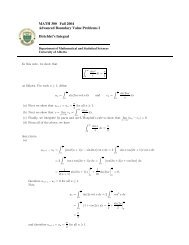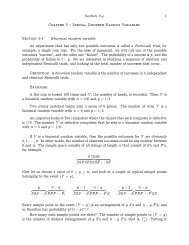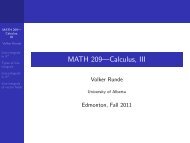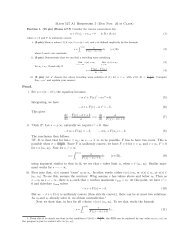Math 411: Honours Complex Variables - University of Alberta
Math 411: Honours Complex Variables - University of Alberta
Math 411: Honours Complex Variables - University of Alberta
You also want an ePaper? Increase the reach of your titles
YUMPU automatically turns print PDFs into web optimized ePapers that Google loves.
so that<br />
u(z) =<br />
� 2π<br />
u(re<br />
0<br />
iθ )Pr(re iθ ,z)dθ.<br />
Suppose now that u is arbitrary. For t ∈ (0,1), define<br />
ut: Br(0)<br />
→ R, z ↦→ u(tz).<br />
t<br />
Then ut is harmonic, and by the foregoing we have<br />
ut(z) =<br />
� 2π<br />
ut(re<br />
0<br />
iθ )Pr(re iθ ,z)dθ<br />
for z ∈ Br(0). Letting t → 1 − (cf. Problem 5.2), we obtain for z ∈ Br(0) that<br />
u(z) = limut(z)<br />
= lim<br />
t→1 t→1<br />
� 2π<br />
ut(re<br />
0<br />
iθ )Pr(re iθ � 2π<br />
,z)dθ = u(re<br />
0<br />
iθ )Pr(re iθ ,z)dθ.<br />
Theorem 14.3. Let r > 0, and let f: ∂Br(0) → R be continuous. Define<br />
�<br />
f(z), z ∈ ∂Br(0),<br />
g: Br[0] → R, z ↦→ � 2π<br />
0 f(reiθ )Pr(reiθ ,z)dθ, z ∈ Br(0).<br />
Then g is harmonic on Br(0) and continuous on Br[0].<br />
Pro<strong>of</strong>. There is no loss <strong>of</strong> generality if we suppose that r = 1.<br />
For z ∈ D and ζ ∈ ∂D, note that<br />
Re<br />
ζ +z<br />
ζ −z = Re(ζ +z)(¯ ζ − ¯z)<br />
|ζ −z| 2 =<br />
As the real part <strong>of</strong> a holomorphic function,<br />
99<br />
1<br />
|ζ −z| 2Re(|ζ|2−|z| 2 +z¯ ζ−ζ¯z) = 1−|z|2<br />
= 2πP1(ζ,z).<br />
|ζ −z| 2<br />
D → R, z ↦→ P1(ζ,z)<br />
is therefore harmonic for each ζ ∈ ∂D. We thus obtain for z = x+iy ∈ D:<br />
(∆g)(z) = ∂2g ∂x2(z)+ ∂2 � 2π<br />
g<br />
∂y2(z) = f(e iθ � 2 ∂<br />
)<br />
∂x2P1(e iθ ,z)+ ∂2<br />
∂y2P1(e iθ �<br />
,z) dθ = 0.<br />
0<br />
Consequently, g is harmonic on Br(0).<br />
What remains to be shown is that g is continuous at any point z0 ∈ ∂D.<br />
Let z0 = e iθ0 , and suppose without loss <strong>of</strong> generality (if necessary considering<br />
instead g(−z)) that θ0 ∈ (0,2π). Let ǫ > 0. We need to find δ > 0 such that<br />
|g(z0)−g(z)|< ǫ for all z ∈ D with |z0 −z|< δ.<br />
For δ0 > 0, let J := [θ0 −2δ0,θ0 +2δ0]. By making δ0 > 0 sufficiently small, we<br />
for θ ∈ J. Set<br />
can ensure that J ⊂ [0,2π] and |f(e iθ )−f(z0)|< ǫ<br />
2<br />
S := {se iθ : s ∈ [0,1), θ ∈ [θ0 −δ0,θ0 +δ0]},<br />
and note that C := inf{|e iθ −z|: θ ∈ [0,2π]\J, z ∈ S} > 0.







